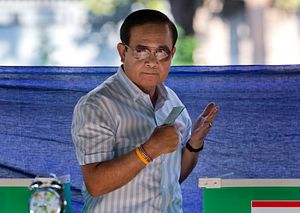If the intent was to indefinitely prolong military rule over Thailand, which has been in place since a coup in May 2014, then the five-time delayed March 2019 election was a success. It was a masterclass in how to steal an election at every level: by drafting a new constitution, disbanding parties, gerrymandering, censoring the opposition, handpicking a Senate, and creating post-facto electoral rules to allocate seats.
While the polling was free, there was nothing fair about the process.
Thailand’s election results pave the way for an illegitimate regime and several more years of political unrest, only suppressed by the coercive powers of the state. The election coincided with the coronation of King Vajiralongkorn, who has proven to be an activist monarch willing to make his imprimatur on politics. If anyone was hoping that the election would end more than 13 years of partisan divide and constant military meddling in politics, they will be deeply disappointed.
How Did We Get Here?
For opponents of the current military regime in power, the election was about the return of power to civilian control. But for the regime, the intent of the election was to once again exorcise the influence of former Prime Minister Thaksin Shinawatra, whose influence has loomed large in democratic Thai politics since his ascension to the premiership in 2001 despite the wishes of the military and royalist elite.
Though Thaksin himself was ousted in a 2006 coup d’etat and then eventually went into self-imposed exile, his Thai Rak Thai party and its successors have won every election held since 2001, with a brief interlude out of office that saw feckless rule by the Democrat Party from 2008 to 2011. Following this period, Thaksin’s younger sister, Yingluck, prevailed at the polls, but despite her attempts to reach out to the military and royalist elites, her government was seen as a proxy for the exiled Thaksin.
After a series of protests and prolonged political paralysis, on May 22, 2014, General Prayut Chan-o-cha staged a coup – the second in eight years – and removed Yingluck from power. Though the coup was welcomed by some as a reprieve amid the polarization that had ensued, there was always a risk that military rule would not only fail to solve the deeper underlying issues, but potentially worsen the situation still further.
The military promised that their rule and elections would heal the country’s deep divisions since the 2006 coup, but in reality military rule only exacerbated these divisions. It was soon abundantly clear that the National Council on Peace and Order (NCPO) had absolutely no interest in national reconciliation. “Happiness” was not “restored to the Thai people,” despite coup leader-turned-Prime Minister Prayut Chan-o-cha’s crooning to that effect.
Indeed, the junta set out from day one to figure out how it could hold on to power indefinitely, while still going through the process of holding elections. In short, the military sought to put in place a system in which they would not have to stage a coup again, but would control everything from within.

































